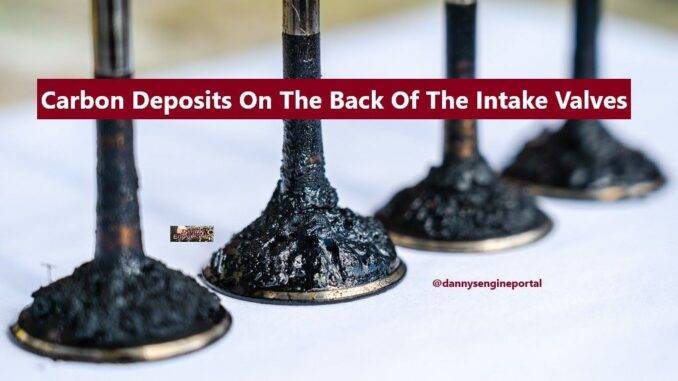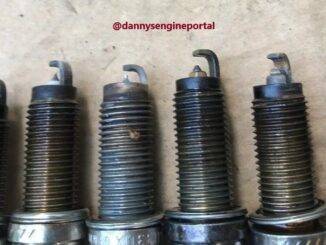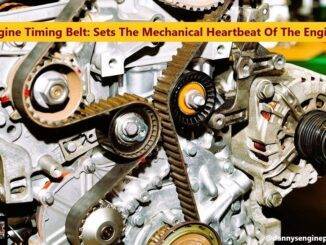
So, carbon deposits are formed, by the black soot that collects, and hardens in your engine.
Consequently, every engine produces carbon. But, some engines are worse than others.
So, the reason all engines have carbon, is simple. Because, carbon is a by product of the combustion process.
Therefore, anytime you have heat, pressure, and oxygen around fuel, you’re going to get the formation of carbon deposits.
So, whether it’s gas or diesel, carbon deposits are going to form. Carbon deposits, create cold performance and fuel economy issues. And, a buildup of carbon inside the combustion chamber, also increases the risk of hot spots. As a result, causing engine damaging preignition. Consequently, the problem is that the carbon buildup, will reduce the airflow to the engine. Thats why, the internal combustion engine is a perfect place, for the formation of carbon deposits.
Carbon Deposits Can Form On Things Like:
- Intake valves.
- Combustion chambers.
- Injector nozzles.
- Pistons.
- (EGR) valves.
- Spark Plugs.
Cause And Effect, From Carbon Deposits
So, carbon deposits in engines, can cause all kinds of problems. In both, port injected and (GDI) engines. If the carbon buildup is in the combustion chamber, it will reduce normal airflow, causing turbulence. That turbulence causes the air and fuel, to mix unevenly. Which means you’ll have areas, of rich and lean mixtures. Consequently, creating hotspots in the combustion chamber.
When Carbon Deposits Build Up In Your Engine, They Can Cause All Kinds Of Problems.
First of all, the engine will lose power. Because, carbon buildup can change, the air to fuel ratio in the engine. Sensors may also stop working properly, because of carbon buildup. This is because, carbon buildup, can keep the intake valve from closing properly. As a result, this can make the engine sluggish, and cause it to stall.
There Are Some Things, That Will Cause Carbon To Build Up Faster:
- Filling the tank with low grade fuel, which is less purified, and usually has more contaminants.
- If the air to fuel ratio is off, as mentioned above, carbon will build up faster.
- Using the car mainly for short trips, can also increase problems with carbon buildup.
Where Do Carbon Deposits Form
Depending on where the deposits form, they can have different effects on the engine. Deposits in the combustion chamber are the most common. And, can form in just a few hundred hours of operation.
Deposits on injectors, happen for mostly the same reasons. Sometimes small amounts of fuel, remain in the injector tip. But, after the engine is shut down, the heat is still there.
Basically, the fuel will get “slow cooked”, polymerizing and react to oxygen. The end result will be, the formation of carbon deposits. And, deposits that form on the intake valves, can restrict airflow, through the intake ports.
Which also causes, a loss of high speed power. The deposits can also act like a sponge, soaking up fuel spray, from the injectors. Furthermore, deposits can also cause, valves to stick or even burn.
Common Symptoms Of Carbon Deposits:
- Hard engine starts.
- Rough cold idle.
- Decreased acceleration.
- Engine misfires.
- Black exhaust smoke, under hard acceleration.
- The (CEL) comes on.
(GDI) Engines, Are Prone To Carbon Buildup Problems
On (GDI) engines with carbon buildup on the valves, you need an entirely different approach. Fuel injector cleaners will not work on that kind of carbon buildup. Because, the fuel never touches, the back of the valves.
In a (GDI) engine the fuel is sprayed, directly into the combustion chamber. As a result, the back of the intake valves never get cleaned.
How To Slow Down, The Accumulation Of Carbon Deposits
So, fuel injector cleaners, can also help injectors, maintain the correct spray pattern. And, they can ensure that the droplets have the correct size and distribution, during ignition. In addition, extra detergents, can help to break down deposits. One of the most effective methods, for preventing a carbon buildup problem, is updating the engine management software. New software, can reduce carbon deposits, by the proper setting of valve and spark timing.
Conclusion
There Are Ways To Limit Its Creation By:
- Using a name brand fuel, that contains a fuel system cleaner.
- Limiting idling time and cold starts.
- Using, high quality oil.
- Keeping the carburetor, fuel injection system, tuned properly.
Also, another contributing factor, is constantly evolving technology. As engines become, more efficient and are able to squeeze out more power, things heat up even more. Also, by playing with the air to fuel ratio, timing and combustion pressure, things only get worse. As a result, carbon build up, is not going away anytime soon.
BY DANNY BENDER




